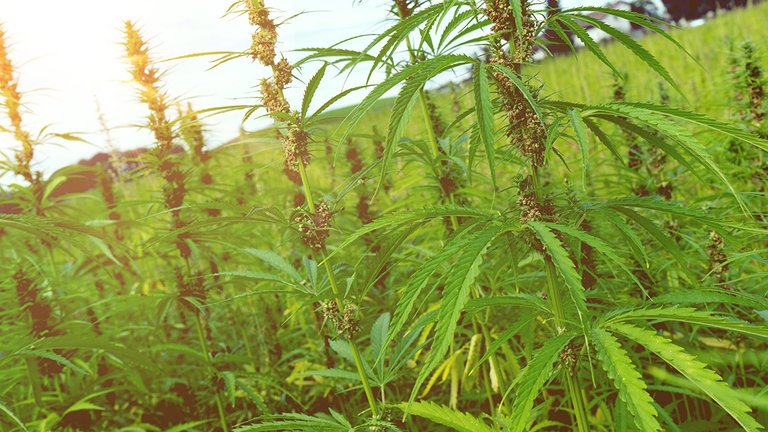
I did not become a vegetarian overnight. On the contrary, my family and I weaned ourselves off of meat almost accidentally. To save money, we decided to live primarily from the food that was coming from our garden and did not purchase any meat. After 2-3 months we felt great and had saved quite a bit on our grocery bills; we asked ourselves, “why kill if we are healthier and saving money not doing so?” Without any fanfare or dramatic incantations, we became vegetarians. That was roughly 4 years ago.
Why kill?
With so many plant based foods available, why do we need to kill creatures to live? Is there some benefit or joy in killing? My meat consumption really boiled down to my own pleasure, habits, and convenience, and little else. Contrasted with so many reasons not to eat animals, the scale tipped and I simply went with it.
Economical
Quality protein and calories are easier and cheaper to come by through plant based means. Hemp seed, walnuts (along with most tree nuts), and oats massively outperform both in yields, calories, and protein per acre. Dry beans marginally outperform the meats, while Chia is a bit behind, but offers greater nutrition and is considered a superfood.
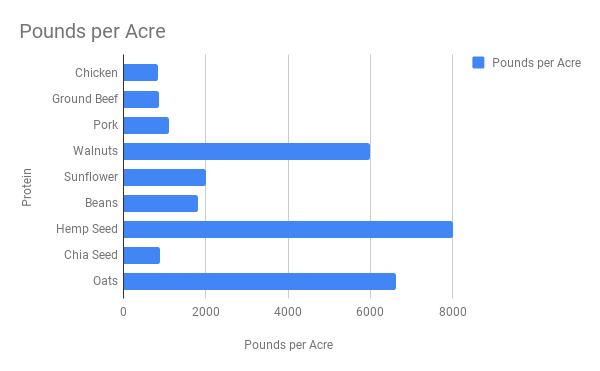
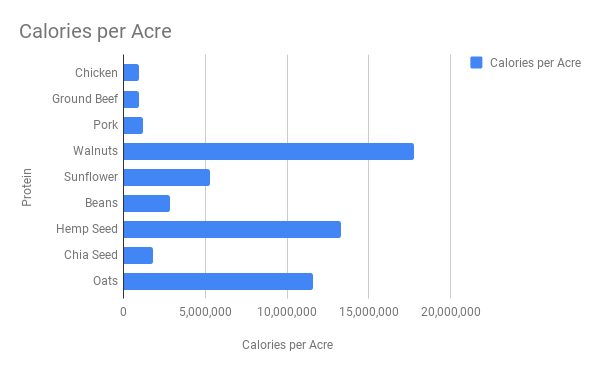
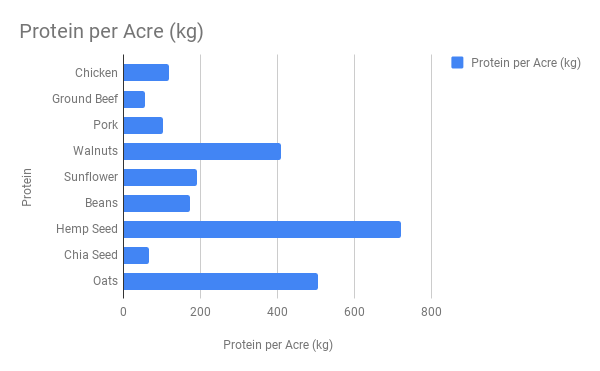
*Meat prices are based from 100% organic local pastured meats
*Plant protein prices are based from 100% organic bought in bulk (5-25 lbs.)
Monthly cost comparison
Average Americans consume 270 lbs of meat a year. If divided equally between the primary animal proteins, this roughly calculates to 3/4 lbs., 830 calories, and 74g of protein a day. Below I’ve compared the cost per month for meat and a vegetarian alternative, both calorie and protein equivalents.

*Vegetarian price analysis based off of 4 parts beans, 2 parts oats, 1 part walnuts, 1 part hemp, 1 part chia, and 1 part pepitas.
*Protein matched Vegetarian diet consists of roughly 5.5oz of beans, 2.75 oz of oats, 1.4oz of walnuts, 1.4oz of hemp, 1.4oz of sunflower seeds, and 1.4oz of chia.
If you are a family consuming organic, local, pastured meats, you’ll save over $60.51 per person by switching to an organic vegetarian diet. There will be problems with protein for the vegan, as this will only provide 40.8g of protein a day. Average female requires 50, and the average male requires 75. In which case they will need to supplement with powders, tofu, or other means. It takes 1,714 calories to get 75g of protein from the vegetarian source. Using a pea or hemp protein powder for 1/4 of your protein will cut on calories and costs.
I try to have an egg, yogurt, cheese, and a protein powder and fruit smoothie daily. I avoid any non fermented milk products and purchase nut milks. The savings I have over meat allows me to buy all of this without increasing my food budget or my cholesterol.
Environmental
Resource use
The amount of water, energy, pharmaceuticals, pesticides, and herbicides it takes to produce a conventional pound of meat is vastly higher than that to produce a conventional pound of beans, soy, nut, or seed. Feed conversion ratios for conventionally raised livestock are 6:1 for cattle, 3.5:1 for swine, and 2:1 for poultry. These ratios are much lower for grass fed and free range livestock.
Fertility
Humanure, green manure, and mycorhyzal fungi can solve all fertility issues. The proper composting of yard waste, mainly leaf litter, by municipalities would also supply the organic matter needed to replace animal fertilizers, without the side affects of over salinization of soils. The use of animals as a fertility source is not a valid argument to keep domesticated animals.
I also hear a lot of livestock being “nature’s tillers,” as to imply the soil needs massive disturbance in order to be productive. The use of landscape fabric or tarps to smother weeds can be more effective, as this method utilizes nature’s true tillers, the soil biology, to prepare a soft and sterile seedbed. Cover cropping and no till practices are becoming popular amongst conventional farmers as well. All of these are effective without the need for livestock. The work, infrastructure, and energy needed to raise them are better put to use elsewhere.
Land Use
Raising cattle and livestock through pure grazing requires massive amounts of land that can produce exponentially more protein if used to grow plant based foods. Most land that can support cattle, can at least support perennial food crops, if not annual crops. The few areas that cannot, due to climate and terrain, can be used for livestock.
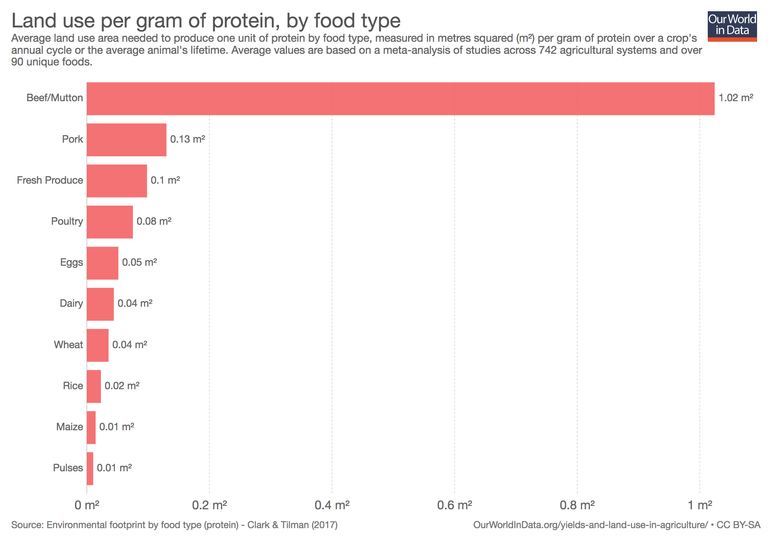
Peak Land
The world will have serious trouble supporting a human population which consumes animal products in quantities matching that of Americans. The world’s total arable land amounts to roughly 0.5 acres per person. If we expand this to all of the worlds prairies, meadows, and grasslands, we have roughly 1.7 acres per person. If we compare the land efficiency of livestock over plant based proteins, the solution is rather obvious.
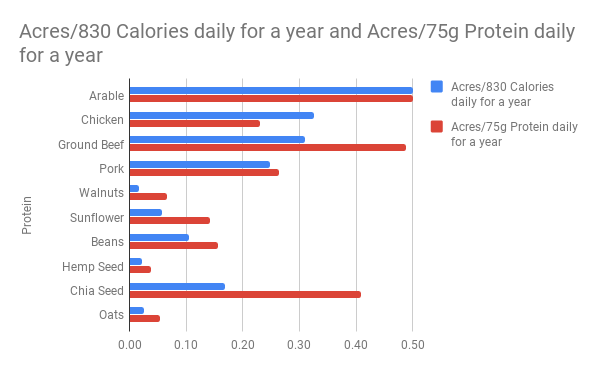
With meat production averaging 0.29 acres per American, we can see how little room there is to budge. Global meat consumption needs to come down, and vegetable protein production needs to replace this in order for us all to fit comfortably here as the population grows.
Biological
Are we made to eat meat?
We don’t have meat receptive (ATP) tastebuds like felines and canines; we can’t taste water like felines and canines—useful for the high salt content in meat; and we have a long intestine evolved to digest plant foods vastly larger than felines, substantially larger than canines, but not as long as foraging herbivores.
Comparing the human digestive system to that of cats, dogs or bears will show a marked difference. We are not pure or omnivorous carnivores. But a true omnivore we are more similar to is the boar. There are very few differences between the human digestive system and the boar’s. Boars do not survive primarily on hunting, but rather scavenge and eat a wide variety of plant foods as well as smaller prey and invertebrates. On the farm, you will find very little meat fed to pigs. Because of their stomache chemistry they are very susceptible to parasites and diseases from meat. They thrive on a vegetarian diet.
We are by definition omnivores, because we can and have historically eaten meat without acute adverse effects. But that alone doesn’t quantify how much meat is healthy, or if no consumption of meat is unhealthy.
How much meat are we fit to eat?
The evidence continues to mount, as more cancers and diseases are being linked to heavy meat consumption. So much so that the American Institute for Cancer Research now recommends 2/3 or more of your plate be made up of plant based foods. I agree with this article by the University of Texas, that we should eat 18 ounces of cooked meat, or less, a week. For me though, there’s greater benefit to eliminating meat entirely from my diet.
Scientifically Marked Benefits
- Lower cholesterol
- Lower blood pressure
- Lower risk for strokes
- Lower risk for cancer
- Lighter bodyweight, 30 pounds (on average)
- 25% less likely to die of heart disease
- 50% less likely to get diabetes
Enough data has been collected to show that vegetarian diets are healthier by and large. This makes it clear enough for me that our biology thrives on a diet comprised almost entirely of plant based foods.
Morals
Feeling bad for animals is not a reason to stop eating them or their products. If that was your primary reason for becoming a vegetarian or vegan I would hope you give your choice some more thought. I saw all the videos of the CAFOs and stopped eating conventional meat. This did not, however, lead me to becoming a vegetarian. Most animals raised well, have much better lives than wild animals. Big ag kills countless amounts of wild animals accidentally with its monstrous war like farming equipment. Moral arguments don’t lead naturally to veganism. And it wasn’t a factor in my choice to become a vegetarian.
Furthermore, there isn’t enough hard data for Vegans and Vegetarians to proselytize their ways. While I firmly believe in all the reasons above, there are counterpoints and valid arguments against each. There are so many ways to farm, organize food production, and distribution, that it’s hard to pinpoint an exact parallel comparison. For the individual homesteader and farmer, one may find his/her land is more efficient at growing cattle over grain, fruit, seed, nuts, or vegetables. Overall however, I think a whole foods plant based diet will come out on top as far as health, economics, and environmental impact. I won’t however argue a moral or ethical superiority to one or the other, and I won’t evangelize this lifestyle.
For me it’s a decision that works for myself and family, and one I’m proud of and convinced of. I think the world and every individual would benefit from a plant based diet, but I don’t think it’s THE solution to all the worlds ills, just a method of living an intentional and low impact life in harmony with my body, goals and values.
Notes:
Prices
Meat prices are rough averages from various cuts from one of the best organic local livestock farmers in MI
What about fish?
Evidence shows that fish present no danger, and can actually reduce the risks of certain cancers. I choose not to eat fish for other factors: the price, the over fishing of our seas, the terrible factory farming methods, and the mercury and other contaminants found in wild caught fish.
Phytic Acid
When switching to legumes, nuts, and seeds as the main source of protein, the phytic acid needs to be considered. Soaking the beans, nuts, and seeds is extremely beneficial and will reduce phytic acids and aid in nutrient absorption.
Sources:
Yields
Chicken Yields
Pork Yields
http://sugarmtnfarm.com/2007/10/12/how-much-land-per-pig/)
Beef Yields: Difficult to assess, but I took the average estimates for grass fed beef (2 cows an acre) with a final meat weight of 475
Walnut Yields
Sunflower Yields
Hemp Yields
Chia Yields
Bean Yields
Ecology
http://www.earthsave.org/environment.htm)
https://www.npr.org/sections/thesalt/2012/06/27/155527365/visualizing-a-nation-of-meat-eaters
https://www.huffingtonpost.com/2014/10/13/food-water-footprint_n_5952862.html
https://ourworldindata.org/yields-and-land-use-in-agriculture/#agricultural-land-use-per-person
https://data.worldbank.org/indicator/AG.LND.ARBL.HA.PC
Biology
https://www.psychologytoday.com/blog/canine-corner/201104/how-good-is-your-dogs-sense-taste
https://www.scientificamerican.com/article/strange-but-true-cats-cannot-taste-sweets/
Health benefits of vegetarianism
https://www.livestrong.com/article/481795-the-statistics-of-vegetarians-vs-meat-eaters/
https://www.health.harvard.edu/staying-healthy/becoming-a-vegetarian
https://www.npr.org/sections/thesalt/2012/06/27/155527365/visualizing-a-nation-of-meat-eaters
http://www.aicr.org/new-american-plate/reduce_diet_new_american_plate_portion.html
https://www.ncbi.nlm.nih.gov/pmc/articles/PMC4691673/
https://www.ncbi.nlm.nih.gov/pubmed/24898235
Here's a brand new documentary for you. They confused you. It's not even a conspiracy theory. It's simple. People want money and they don't care about other people's or animal's lives. All they have to do is get you confused. On the other side, the evidence we show cannot be disputed.
Become logically and ethically consistent. Become an ethical vegan.
Everyone should watch this! It's incredible the lies that the public have been told over the years. Every single nutrient the human body needs can be found in a plant based diet.
My choice to go Vegan doesn't just come from wanting to stop animal cruelty but also from wanting to make the world a better place. Companies like Beyond Meat and Impossible Foods are making the shift to veganism very easy for meat lovers.
Hey @theferalone.
It's nice that you took the time to research this. However, I must debunk some of your points, them being simply untrue.
Being a vegetarian to prevent killing of animals is the same as eating less meat to do the same - animal agriculture is animal agriculture and killing is (almost) always a part of it. To produce milk the cow needs to be fertilized which means you'll have a lot of calves. Males and females are born in a 50-50% ratio - what are you going to do with the males? Similar can be applied to birds aswell - you need to breed them to eat them, and chickens for example, require much more females to satisfy the sexual needs of the males - you're gonna have to kill.
Growing grain to feed livestock for meat is totally pointless, you're on point there - but so is growing grain to feed livestock for milk/eggs or whatever.
Moderation is a fallacy altogather. Check out this Greger's video.
Here's another one on fish.
Aaaand here's another one on phytates.
There are plenty of very strong reasons to go vegan - and all counterarguments are, in fact, excuses.
In the health aspect, it is completely superior - no other diet decreases chronic disease risk so much.
In the ethical aspect it is completely obvious - you cannot be ethical and go around killing sentient living beings that have been proven to feel pain.
In the ecological aspect, land use reduction and greenhouse gas emission reduction is, again, superior.
Don't be such an apologist. Become an ethical vegan, look at what Greger is telling you and you'll find yourself having very firm points.
Btw, followed you for the permaculture (and the possibility of you becoming a real vegan) ;)
Im totally agreeing with you. Im a happy Vegan! 😁
I am not sure if I agree that veganism is completely superior from a health aspect. I think it depends on the individual. Many (most?) people can go vegan and feel great if they make an effort to find alternate sources of protein, etc. Humans evolved as carnivores over millennia; I would be surprised if evolution would select for such a costly trait unless it was providing some health benefit for that particular species.
One friend of mine had a terrible paradox. She had recently taken precepts as part of converting to Zen Buddhism and her personal interpretation was that she should become a vegan to facilitate this.
After about 18 months, she had to quit and go back to a diet with meat and dairy because her health was deteriorating visibly and rapidly. She spoke with her teacher (and doctor) about this at great length and the teacher told her that while it is noble to become a vegan to reduce suffering in the world, one should not try to reduce suffering in ways that increase your own suffering. She tried all sorts of ways to stay vegan including tons of supplements, careful nutrition, and so on. For whatever reason, her body does not function well in a vegan state. I think this is the exception rather than the rule, but people with absorption problems, etc. need to be more careful when switching to a vegan diet.
Again, a fallacy. Our bodies did NOT evolve to become carnivore, but herbivore (fruit, veggie, nut and grain eating herbivore). To support my claim, I offer to you to watch these three videos.
About your friend, it's just an anecdote with absolutely no proof. Studies on thousands of people are obviously true, while your friend's story might as well be just a story.
People with absorption problems need to be careful following ANY diet!
Life isn't always as cut and dry as we like it to be. Every body is different, what may work for one can be harmful for another. My wife and I have very different needs, she doesn't do well with a lot of nuts, I can drop a mason jar and feel great. Thank you for sharing.
I would totally agree that there are plenty of strong reasons to go vegan. But there are some assumptions you are jumping to that were outside of the scope of my article.
I listed very little data on dairy for a reason, there's no outstanding data that says they are nutritionally, economically, and ecologically unsound in moderation. Without the data to match the fervor, it's hard to stand so firmly on an ideology.
Ethically with dairy, you have somewhat of a point. But these ethical issues scale with the size of the farm.
I had my own flock of chickens for a few years. I got my initial flock from a local guy who bred all of his chickens and kept the roosters. They ate only our kitchen scraps and what they could forage for most of the year. They also provided extra fertilizer for the garden. I did end up buying more from an online breeder, and yes, they culled the males. But maybe 15 baby chicks in total. For 5 + years of egg production, that's 1 bird death for every 1216 eggs. I would think a cat would kill more birds in that time it takes to consume those eggs.
Small scale organic grass fed dairy farmers usually take great care of their animals, and if they do cull one, every part of the animal is used for some purpose. Milk farming doesn't have to be unethical, it just is to maximize prophets in most cases.
Maybe one day I'll be a vegan. I have nothing against the diet. But the sensationalism needs to calm down a bit with the community. I left religion for a reason. Anyone eating less meat is doing better for their bodies and the environment. Everyone can choose what that looks like for them.
Thanks for the follow and hopefully we can continue the conversation in the future :D
Heey, milk causes cancer and that's not enough?
About the chickens, 15 killed chickens is still 15 sentient life taken away for absolutely no reason. As I have said, being a vegetarian is like eating less meat. In this case, a lot less meat.
Yea, it looks like you're into the "personal choice" now... And you know, the animal has no choice, right?
Connecting veganism to religion is like connecting people that were against black slavery to religion. It's not a religion, mkay?
It's a rights movement.
We need to give all sentient beings a right to live, to be free, and NOT to be abused.
One way to do that obviously - becoming an ethical vegan.
I would appreciate for you to post studies as the sources instead of videos. A simple link will do. I am comparing proselytizing veganism to religion because they both are based on dogma and extremism. We’re on the same side, yet you seem to be trying to force your brand of thinking on everyone else. I don’t think that’s an affective method of bringing about change.
The video is full of studies you can bring out of it. I'm not going to do that for you. Lemme rephrase it - it's not dogma, it's not extremism, extreme is the one killing the pig and raping the cow. Bye bye
I enjoyed your post. I have been meat free for over 6 years and vegan for over 6 months. I have found that I don't really try to show or convince anyone of the details. I feel great, and that is what I show them. It wasn't until I was 100% vegan for a while, that i started to consider the morality of it. Or to think about the death part, or taking breathe in exchange for calories. It is growing less worth it everyday. Cheers!
Wow great post, very thoroughly researched and cited, and I think a great job of discussing the issues in a level-headed fashion without descending into the near-religious fervor you so often see surrounding this topic from the "true believers". Very happy to have found you today, following and looking forward to more great posts! Cheers - Carl
Thanks for the follow and I appreciate the comment! The interwebs is filled with so much sensationalism and clickbait, and I'm trying to offer my two cents into these subjects with real data and an approach that isn't so divisive. I'm glad that resonated with you!
Exactly what people need today, if you ask me. Real data, real information, timely- and relevant. Thank you for pouring so much time and effort for this post. This is much appreciated since the animals we get our meat from need a voice- and yours might be the one they all need. Why kill indeed?
So much really good information here! I don’t think I will be able to give up eating meat, but can completely appreciate anyone that does stop, especially for the reasons you listed above. Thanks so much for sharing. Btw, I am a curator for @ocd and would love to nominate your post.
This gem of a post was discovered by the OCD Team!
Reply to this comment if you accept, and are willing to let us share your gem of a post! By accepting this, you have a chance to receive extra rewards and one of your photos in this article may be used in our compilation post!
You can follow @ocd – learn more about the project and see other Gems! We strive for transparency.
Let me know if you have any questions regarding the project or nomination. Hope to hear from you soon!
If you would like your posts to be resteemed by @ocd to reach a bigger audience, use the tag #ocd-resteem. You can read about it here.
Thanks so much! I'm glad you found the post informative. I tried my best to present meaningful data without this becoming another vegetarian sensationalist post. There are a lot of claims out there coming from all sides of the debate; I wanted to present the most verified and agreed upon data and avoid the cliffs.
I think that is definitely what you have done here. Definitely avoided the sensationalism that I have seen come along with vegetarians before. Btw, would you mind if I nominated this post for @ocd? Would love to share it there.
Not at all, please do :D
As I see you don't plan to giveup meat any time soon, would you mind having a look at my comment below that addresses some important aspects to the data presented in this article. I am in defense of omnivorism, but of more humane methods, 100%grassfed/free range, etc. Thanks!!
Keep up the good work with @ocd !!!! I love the articles you all find!
Wow. What an amazing and very informative post. Worth reading. I just wish I could stop eating meat myself as well. Lately, I've become an animal lover- of all sorts. Hoping this newfound love of mine for animals would drive me to become a vegetarian. Plus the savings would be great too!
Glad you enjoyed it! It isn't a zero sum game, replacing any portion of meat with a plant based protein will make a difference. Sometimes starting off slow is the easiest route. It is a huge lifestyle change.
Yes. Thank you for the advice @theferalone!
I appreciate your post and look forward to reading more plus learning and gardening tips you may have. What part of the country do you live in? We currently raise a large portion of our food all of our own meat plus large gardens and fruit(80%) for a family of 7.
Thanks! I’m from Michigan, moved from NY about 7 years ago. My family is a bit smaller at 4, we do mostly intensive vegetable gardening, and I am working on establishing orchards and perennial food systems. But plants are expensive, so I’ve been doing small plantings to eventually propagate and expand. I gave you a follow, I’m looking to connect with all the steemian homesteaders, farmers, and gardeners I can.
Thank you for providing all of this info. I am pretty blown away by the numbers. I am skeptical lately about the process that the meat goes through to get to my fridge. This is in part because I had my first shore-line fish lunch (Walleye) and it was the best fish I ever ate. I've considered consuming less meat, but come dinner time our main choice is steak or chicken. Why is that? I know that it's absolutely delicious. It's just "the normal" thing these days. I think I eat meat "because I'm used to it". However; fresh meat is unlike any meat I can buy.
I will consider eating less than 18 oz of meat per weak, and I will consider healthier alternatives moving forward. Unfortunately, dropping meat from my diet might not be something I can do. Considering all the processing that takes place when they cut the meat and package it for us, which I have seen many videos about, I do find myself questioning what it is I'm eating and if it's even healthy. This happened to me tonight as I chewed on my steak. I also can say that I enjoyed the salad, so full of flavor, over the steak. There were bacon bits in it though....just can't get away from it.
I am so happy that you took the time to compose this wonderful blog. I myself have recently embraced vegan living. It's been over 2 months now since I last at meat and my body really thanks me for it! I feel so much better and have so much more energy since eating only a plant based diet. Do you eat dairy? You should totally ditch the dairy too.
Im following your blog now. 😉
I do eat dairy. There's a multitude of reasons, and a few excuses. In general, for homesteaders dairy presents a very sustainable form of protein and omega 3s. I had a flock of chickens that lived only off of our vegetable scraps, and we got 6 eggs a day. I'm not apposed to the vegan diet, but to get the nutrition I need at this point it would require a lot of supplementing. Eventually I may get there.
Congratulations @theferalone! You have completed some achievement on Steemit and have been rewarded with new badge(s) :
Click on any badge to view your own Board of Honor on SteemitBoard.
For more information about SteemitBoard, click here
If you no longer want to receive notifications, reply to this comment with the word
STOPI appreciate the article. I can bare vegetarians more than vegans. But there are numerous faults and unfortunate "cause and effect" facts that remove some of the weight from your analysis.
Until I decide to do my own post about it, I will just mention these two:
every animal dies. In the wild their death is usually a traumatic and extrememly stressful event. This happens when, because of sickness or injury, they are too weak to outrun the predator anymore. At this point they are chased down and torn to death. This is a top reason to view hunting as a humane act. The clean shot is a quick and less painful death compared to the alternative. Additionally, as you and I both consume dairy and eggs, at some point the providing animal grows old and must die. Why not, in both of these cases, we consume this meat in respect to the animal and, since meat nutrition is quite dense, to so as to benefit from what otherwise would be waste. The alternative, would be to use these aged and hunted animals purely for dog food. Which would be fine, that is better than wasting them.
"How much meat are we fit to eat?
The evidence continues to mount, as more cancers and diseases are being linked to heavy meat consumption."
I would argue wholeheartedly that this link, if valid, has to do 100% with the meat animal's diet. Over the last 40-60 years we have fed our beef and chicken an increasing amount of corn and soy. Neither of these should ever be fed in high quantities. However, due in large part to government subsidies, these are the biggest bang for the buck, weight wise, to the meat cartel. Fat from a high corn diet is a leading cause of bad cholesterol, etc. Humans also should not be consuming large amounts of corn or soy. And when consuming corn, wheat, soy, etc, we are best suited eating fermented or aged grains. Though this NEVER happens in processed foods or mass produced flours.
If we were still eating grass fed, naturally raised, naturally(live in sun light and eat a large variety of plants and bugs) managed livestock, I doubt there would be any cancers, heart disease, etc from any meat consumption.
And along with that, if heavily processed food was not a thing; if chemical agriculture was not a thing.... The price of good quality meat would be comparable to the price of a vegetarian diet.
So, I appreciate your concern and your decision in the matter, but I feel you are burning the candle from the wrong end in an effort to find answers. Going about it the wrong way. But I do not tell vegetarians, vegans or DoritoLaysNabiscoMcDonaldsians can't eat how they choose. Everyone has a choice. I just I wish I didn't have to pay for their(at least the last category) bad decisions in the embodiment of Socialized Heathcare and Medicaid.
I think your prices quoted are probably accurate at the moment. What I said was:
" if chemical agriculture was not a thing.... The price of good quality meat would be comparable to the price of a vegetarian diet."
And that is partially a thing because of the farm subsidies you mentioned. Your last bullet point I totally agree with.
My prices were comparing organic agriculture to small scale organic, free range, grass fed animal agriculture. I think these prices will stay pretty much the same if chemical agriculture were not a thing.
I don't know. I think the huge market share that chemical and processed food holds really skews the market. I'm pretty sure there would be a huge change in prices if there was only local food, and more expensive exotic food.
But to be honest.... it is only speculation since we will never see a 100% overhaul unless there is a nuclear holocaust or some other really HUGE infrastructure changing event.
I guess if the only supply were small scale sustainable organic foods, the prices would change. But I’m not sure in which direction.
Congratulations @theferalone!
Your post was mentioned in the hit parade in the following category:
Vegetables has very low calories and fats. it contains a large amount of vitamins. Otherwise fast food and meat contains large amount of calories and fat. Becoming a fat person is very simple in these days. because we take too much calories and burn or use them very low.
Thank you for your informative post.
Dear Theferalone.
Have you try Pho?.. Vietnamese noodle soup....
Yes, it's a well done research, but please don't forget to consider what your body wish, here is some help about this:
Eating correctly? My answer on the new Vegetarianism Stack Exchange — Steemit